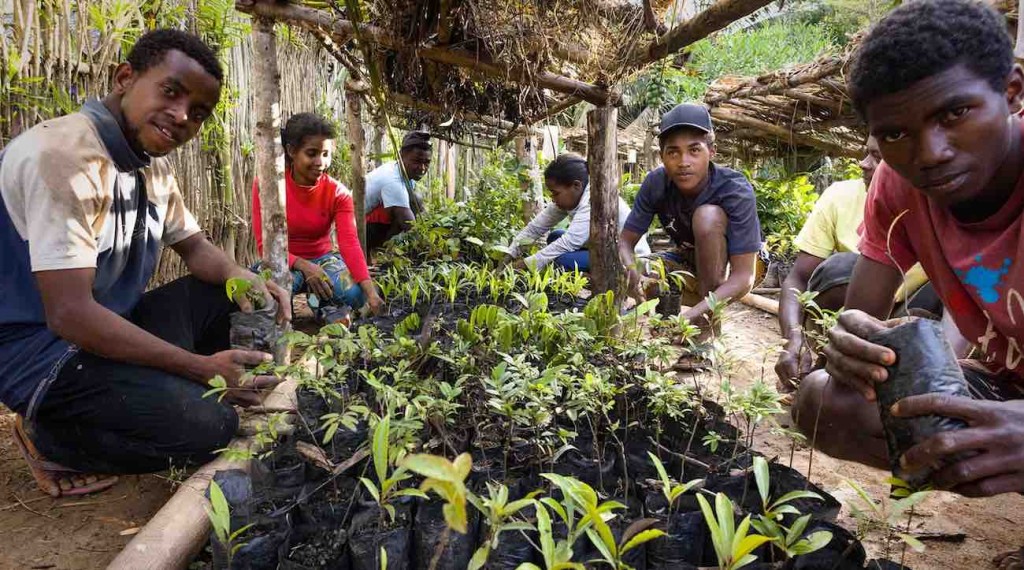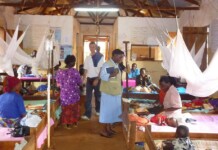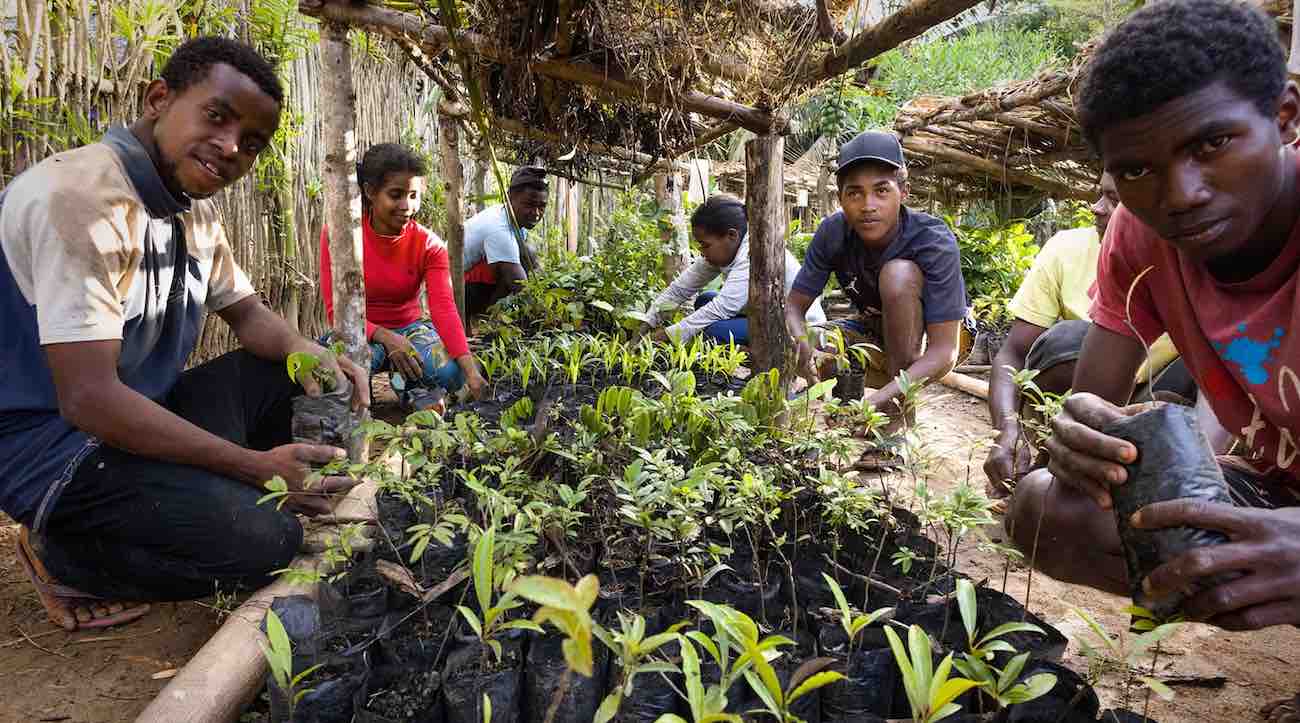
Reprinted with permission from World at Large, an independent news outlet covering conflict, travel, science, conservation, and health and fitness.
This is Part 1 of a two-part exclusive on World at Large.
Out in the ultra-rural jungles of eastern Madagascar, something is happening that all climate-conscious philanthropists and investors should take note of.
A few intrepid locals have created a 6-year, work-for-knowledge program that’s turning jobless country folk into passionate, skilled, forest management agents and entrepreneurs, ready to show the world that they themselves have the power to restore the glory of Madagascar’s stunning biodiversity.
Organized by a Malagasy woman and her Wall Street ex-pat husband, Green Again Madagascar is unlike any other tree-planting nonprofit around.
“It’s really exemplary of bottom-up restoration,” Leighton Reid, assistant professor in the School of Plant and Environmental Sciences at Virginia Tech, who conducted research for the group, told WaL.
Tree planting has become all the rage as a way for corporations and international aid and development agencies to help alleviate poverty and prevent climate change by offsetting carbon emissions. Huge issues—largely unreported, go along with this activity, however.
Studies have shown that carbon sequestration in the roots of trees planted by hand is often overestimated. Incentives and aid handouts to communities for tree planting have been shown to primarily create monocrop agriculture forests of rubber or other commodities, rather than native forests, that are easily destroyed.
One study in Chile found that landowners simply clear-cut the forests on their land and replanted them just to get the government handout.
If William Easterly’s groundbreaking 2006 book White Man’s Burden is any indication of the lack of success of internationally-imposed development in poor countries, Green Again Madagascar is the cure for such failures—the ultimate bottom-up operation of development and accountability.
Green Again is planting dozens of native tree species to create diverse and complex reforested ecosystems, all while putting faith and function into some of the poorest people on the continent.
Retirement
In 2013, Leighton Reid was working for the University of Missouri’s botany programs in Madagascar when he came to meet Matt Hill, a retiree to Madagascar in 2011 after a 15 year-career on Wall Street.
“That works well for 4 or 5 months then it gets old—drinking and partying,” Hill told WaL, describing his island life.
Between 2011 and 2013, Hill regularly found the motivation for individual projects that interested him, where he could apply his skills in data collection as well as his retirement money to make a difference.
“A way of describing Green Again is not that we plant trees at all, because we don’t—Green Again plant zero trees. What we do is run an eco-school that’s a 6-year training program to take illiterate farmers who want to reforest their own family land,” Hill said. “What we do is we’re a tree-planting entrepreneurial launching”.
Typically, Green Again’s recruits are any rural inhabitants that live around a 60-90 minute walk from the tree nursery. They spend 2 years learning how to work in the nurseries and in the field planting trees, then—and only if they so choose—they can move onto the next level of training where they learn data collection and data entry; crucial to ensuring large companies buying carbon offsets or tree-planting credits like GMO Captial, one of Green Again’s contracted clients, can be accountable to their own aspirations.
“That [tree nursery] crew is paid and owned and managed and officed by another local Malagasy person that has graduated from our eco-school,” said Hill.
MORE NEWS LIKE THIS: This Wonder Tree is a Game-Changer for Rainforest Agriculture in Honduras And Deforested Sites Worldwide
In fact, Mr. Hill is not just the only non-Malagasy working at Green Again, but he’s the only person at all that wasn’t born or doesn’t live within that 60-90 minute communal radius.
“So that’s why we get the buy-in from locals; they’re really [skeptical,] like, ‘I don’t know about someone coming on my land, oh wait, it’s Jimmy John? Oh I was there when he was born’”.
Trust is a major issue in developing economies since there’s very little ability for people to seek recourse against those who violate simple business contracts and agreements. Green Again gets around this critical problem in top-down development aid projects by recruiting people who live right in the area where a nursery and tree business is working in.
Growing people growing trees
By the end of 6 years and 12 exams worth of material, the Malagasy leaders at Green Again have learned to produce cash flow projections, manage their own banking, and do their own taxes, some of whom start without the ability to read, or even to properly hold a pencil.
Riding the first wave of graduates was Catherine Sangotra Hill, CFO of Green Again, the first regional office manager for the nonprofit in Tsarasaotra village, as well as owner and operator of the LLC Tamerina Ala Maintso Malagasy, which plants dozens of rainforest acres (slowly over 60 months) in the extremely remote upper Fanandrana river basin.
MORE TREE PLANTING: ‘Important Message of Hope’ Made by Re-Planting Extinct Tree Species on Hawaii
Green Again has used local knowledge to augment the number of species planted to 64, compared to 5 which is what most reforestation projects can manage.
In addition to her work at her LLC and Green Again, Catherine is a mother of 2 and mentor of many, including Marcellin Velo, another of the graduates from Green Again’s eco-school who runs his own business, became the first person in his family ever to own land, and works as another of the regional office managers for Green Again.
In late December Catherine found herself in the middle of an ecosystem crime trial when a rural man had accidentally burned a large section of village forest after poorly planning a controlled burn on his own land. Mediating on the perpetrator’s behalf, Catherine showed him how to properly restore forests, while working off his debt to the village in Catherine’s crew.
Mr. Hill notes that all kinds of people who enter adulthood with no prospects whatsoever, end up being driven towards Green Again by older folks people with a nostalgia for forests the way they used to be in Madagascar.
“It’s kind of odd, but initially it ends up that their grandmas are pushing them into it,” said Hill. “So grandma and grandpas often see their grandchildren kind of sitting around kind of not working hard, and they say ’well you could do something good for yourself, you could do something good for the family and earn something and chip and, and you could do something good for all our farms, the environment, and Madagascar; why don’t you go sign up at Green Again?”
MORE AFRICA NEWS: Critically-Endangered West African Lion Going from Strength to Strength in Niokolo Koba, Senegal
“I would say, probably 70% of our people who we’ve never seen before who sign up; it’s because one grandma talked to another grandma”.
Workers start off at 120% of the normal daily rate for laborers in that part of the world, and for every level of the course they complete they get what amounts to around a 15% pay raise. By the time the man or woman completes the whole course, they’re making about 50 times more than when they started.
A mandatory 20% savings rate is required of all payroll which is set aside toward whatever goal it is that the individual has chosen for themselves, which could be the purchase of land, the construction of buildings on family property, or collateral as a loan to launch a business.
All this has the added benefit of creating a highly-motivated workforce, who by their own entrepreneurial vision, their sense of responsibility to their community, base greed, or the urging from their family members, are creating the highest-quality native reforestation in a part of the world where nearly three-fourths of all known plant species grow exclusively there.
Part 2 of this story will be released later this month…
SHARE This Amazing, Transformational Program With Your Friends…




















